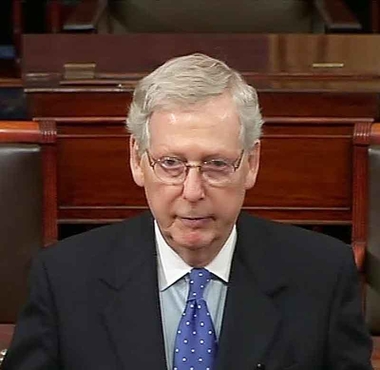Mitch McConnell just raised the stakes for Democrats on impeachment

OPINION
Senate Majority Leader Mitch McConnell took to the Senate floor Tuesday morning to deliver a very clear message to Democrats: You continue to push the Mueller report -- and everything around it -- at your political peril.
"With an exhaustive investigation complete, would the country finally unify to confront the real challenges before us," asked McConnell. "Would we finally be able to move on from partisan paralysis and breathless conspiracy theorizing? Or would we remain consumed by unhinged partisanship, and keep dividing ourselves to the point that [Russian president Vladimir] Putin and his agents need only stand on the sidelines and watch as their job is done for them?"
McConnell's speech come amid a rapid ratcheting up of tensions between House Democrats and the White House. House Judiciary Committee Chairman Jerry Nadler, D-New York, is preparing to hold Attorney General William Barr in contempt of Congress this week unless the Justice Department turns over the full, unredacted Mueller report. Trump himself has said he doesn't want special counsel Robert Mueller or former White House counsel Don McGahn to testify before Congress about the Russia investigation. And on and on. Daggers drawn in a battle over Constitutional powers.
Democrats quickly dismissed McConnell's urging to move on. Senate Minority Leader Chuck Schumer of New York called it "sort of like Richard Nixon saying let's move on" -- equating the allegations of obstruction of justice against Trump to the corruption allegations that led Nixon to resign before he was impeached by Congress.
Look. Both sides are blustering here. But, beneath the bravado of Democrats about the need to continue to investigate leads from the Mueller report -- particularly as it relates to the possibility that Trump obstructed justice -- there is a very real question that McConnell's speech gets to: Are they hurting their own political prospects by continuing to focus on investigating Trump and his administration on its ties to Russia?
There's some reason to believe that the public is ready to move on. In an April CNN-SSRS poll, 44% said that Democrats in Congress were doing "too much" to investigate Trump while 25% said they were doing too little and 28% called it the right amount. Those numbers are rightly read as a warning sign to Democrats, as is the trend line on them: in a March CNN poll, 38% thought Democrats in Congress were doing too much to investigate Trump while 34% said they were doing the right amount.
House Speaker Nancy Pelosi, who spearheaded the successful effort to retake control of the House in 2018, has made clear over recent weeks that focusing on things like impeaching Trump should take a back seat to educating voters about what the President's policies have meant in their lives.
"Our passions were for health care, bigger paychecks, cleaner government — a simple message," Pelosi told The New York Times over the weekend about the 2018 election. "We did not engage in some of the other exuberances that exist in our party."
And Democratic pollster John Anzalone, who was heavily involved in President Barack Obama's 2012 re-election race, has been regularly arguing on Twitter that the party needs to focus more on health care and less on impeachment. Tweeting a picture of the latest results from an NBC-Wall Street Journal poll showing health care as the leading issue for voters, Anzalone wrote: "Seems like Congressional Dems should be holding hearings and votes on Healthcare every week according to this @NBCNews poll."
There's little question that Democrats face a choice in the wake of the release of the Mueller report. While there appears to be clear evidence of obstruction by Trump in the report, Mueller made no recommendation on whether Trump should be charged -- and Barr decided not to. Mueller was clearer that he found no provable evidence of collusion between the Trump campaign and the Russians. Like it or not, neither Trump nor anyone in his family will be charged as a result of the Mueller report.
Those facts don't exonerate Trump, of course. In fact, Mueller says directly in his report that his findings don't exonerate the President. But much of politics is about what you choose to prioritize -- and what that says about your party to both your base and to unaffiliated voters who have traditionally decided national elections.
There's little question that the Democratic base wants Democrats to push all the way to impeachment on Trump. If they had their druthers, Trump would already be removed from office. But, is doing what the base wants the right move for Democrats? Would the Democratic base abandon the party's eventual nominee against Trump in 2020 if he or she spent most of their time talking about healthcare and immigration rather than about investigations and impeachment?
McConnell's speech on Tuesday puts public voice to something lots of Republicans have been whispering in private: If Democrats choose to go the investigation/impeachment route, it gives Trump a real chance to win in 2020. Suddenly, Trump is the victim of an out-of-control party of liberals and socialists who hate him personally and can't see all the good things he is doing for the economy and the country!
"Trump is goading us to impeach him," Pelosi said Tuesday at an event in New York City. "That's what he's doing. Every single day he's just like taunting taunting taunting because he knows that it would be very divisive in the country, but he doesn't really care. He just wants to solidify his base."
Now McConnell is doing the same. The question is how Democrats react to the taunting.
Analysis by Chris Cillizza, CNN Editor-at-large. The-CNN-Wire™ & © 2019 Cable News Network, Inc., a Time Warner Company. All rights reserved.
The Gayly – May 7, 2019 @ 3:45 p.m. CDT.





